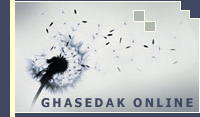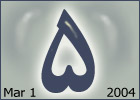Issue 5
Hamid R. Yazdi
Don't be fooled by the title. It may sound impressive, but I'm going to make a fairly obvious observation; but to get to the point, you remember how in Iran we'd often hear comments like this: "so they finally married their daughter off to an Esfuni?" Or to insult someone we'd call them "kaddy" meaning a villager? How about our jokes, you remember those? About the Rashtis and the Turks and the Qazvinis and so forth? We may have taken, or still do take, these for granted, but if you think about it, doesn't it all go back to our caste-system mentality? Was Iran not the first world empire that instituted and practiced a firm class system? You may think my argument falls apart because I'm focusing just on one aspect of the culture. Don't you worry; I'm going to give you plenty of others. Now, when we bestow upon our backward poor fellow Iranians the honour of visiting the country every few years, aren't we considered "higher-ups," proudly displayed and kept in high regard? (As a side note in brackets, just between you and me, don't we consider ourselves as such as well? Now, now, no need to feel embarrassed; just a side note). Let me elaborate a bit more. You remember how in Iran after graduating from the university you'd fit into four neat categories (just like the four classes of the ancient Persian caste system)? You were either a doctor, an engineer, an edāri/civil servant, or a teacher. This last one is of special interest to the humble author of these great lines of wisdom. No matter what field in the core sciences you studied, and no matter how far you went in it, be it chemistry, physics, mathematics, or what have you, you'd end up a teacher. Now you think it's any wonder that we're so scientifically and technologically challenged? Don't remind me of the Arts. I won't even go there. But come on, don't be so negative. If we can't make any good use of arts and sciences, at least we always have, and continue to, furnish humanity with numerous doctors and engineers. We have no shortage of doctors and engineers, say māshāllāh, so much so that we could supply other nations and still have enough left for ourselves – for uptown Tehran, that is. In Iran anything outside of these four categories is not even comprehended. You've got to be one of the four, or you won't have a social definition. Last year in Iran, I was invited to a family party. The son-in-law of the host, an engineer (what else?), kept calling me "āghāy-e doctor." I told him that I wasn't a doctor. I just teach at a community college. I insisted and he declined until the matter was finally settled: I gave up. I was the " āghāy-e doctor" after all. That was Iran though. Here things are different. We liberal-minded and "pishrafte" Iranian expatriates have a much more sophisticated perspective on people and education. And here's how we've improved on the backward notions of our counterparts in Iran: We have totally revolutionized and modernized the good old caste system. Instead of the four categories in Iran, we now have seven! I propose that a studious and interested student take up the task of examining the mythic significance of these numbers, 4 and 7, since I have more important things to occupy myself with, namely make fairly obvious observations. But I digress again. Those seven categories are as follows: doctor, engineer, teacher (now upgraded to professor), businessman (you know how everybody wants to do beezeeness?) pizza man, insurance broker, and, oh yes, real state agent. So as you can see, we've added the last three categories, thus breaking the old molds and flowing with the current of modernity, or post-modernity, or whatever. Someone should do a survey of this. I bet you 95% of us fit in these classifications. In a website dedicated to and listing "great Iranians," of all the numerous PhD's listed, not a single one of them had a degree in anything outside of medical or engineering sciences. Not a single soul. Not that there’s anything wrong with that; not at all. But not even professor Yarshater, for instance, author of the monumental Encyclopedia Iranica, was mentioned. He was simply too insignificant to be mentioned. They’ve changed the website now, throwing in one here or there, but you get the point. And to top it all off, we expect the people in the first two categories, doctors and engineers, to solve all our existing problems: arts, politics, social issues. We all know that the comments a doctor or engineer makes regarding a social issue, say, is much more widely accepted than those of an actual anthropologist. The few there are, we push them into their own academic solitude. We expect engineers and doctors to solve the problems of our ailing state of arts and letters too. As if we needed a dentist to pull that decaying tooth of our poetry, or an engineer to hammer the rusting body of our prose a bit. No wonder that many of our “literary circles” are peopled by these azizān. No wonder Hedayat couldn't pursue his dentistry or engineering studies, as he had been expected to: He was an artist. And no wonder he felt alienated and committed suicide: He didn't fit.












